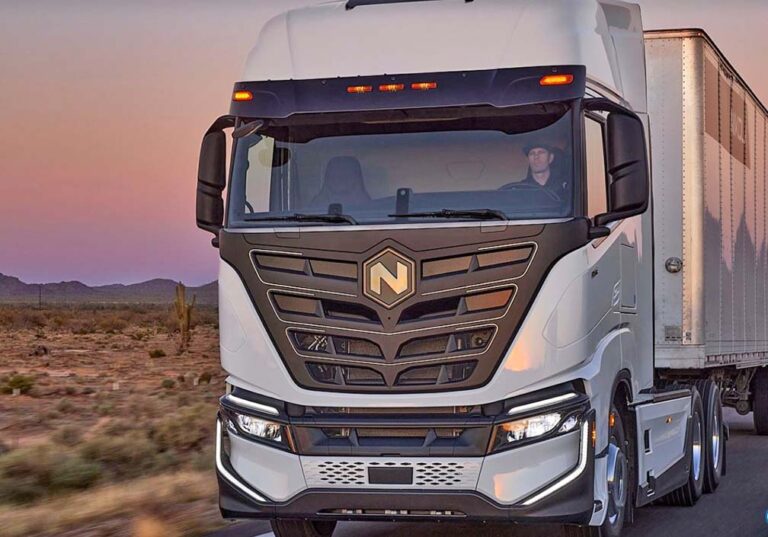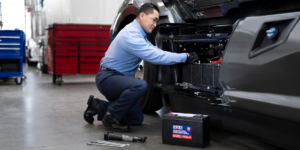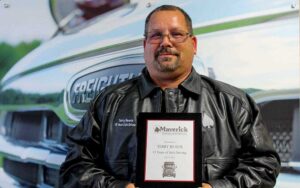WASHINGTON — One of the hottest topics in trucking today is electrification.
That subject is top of mind for Taki Darakos, PITT OHIO’s fleet manager.
Darakos oversees the acquisition and maintenance of 1,550 company-owned tractors and box trucks and testified before Congress on April 30 about the technological, operational and financial challenges fleets face as federal and state regulations mandate the adoption of battery-electric trucks.
Darakos was one of several trucking industry stakeholders to appear at the House Subcommittee on Highways and Transit’s hearing titled “It’s Electric: A Review of Fleet Electrification Efforts”
“After meticulous evaluation and planning with our truck manufacturer, we put into service our first battery-electric trucks,” Darakos said, according to a news release from the American Trucking Associations (ATA). “Although battery-electric trucks show promise in certain applications, they are not ready for broad deployment due to technology limitations.”
PITT OHIO is a freight transportation provider that operates in 14 states out of 25 terminals and employs more than 3,500 people. As the Vice President of Vehicle Maintenance and Fleet Service at PITT OHIO, Darakos shared his extensive, real-world experience with the House Subcommittee on Highways and Transit.
Two years ago, PITT OHIO received its first battery-electric trucks.
According to the ATA, Darakos told Congress that despite his company taking a proactive approach and making a concerted effort to adopt this technology, the increased weight, prolonged charging periods and minimal driving range have proved to be significant challenges.
Additionally, each battery-electric truck costs up to 3.5 times more than a clean-diesel equivalent.
PITT OHIO’s clean-diesel tractors average 650-700 miles per day, which is significantly more range than battery-electric Class 8 tractors can handle on a single charge. By contrast, clean-diesel powertrains can refuel in 15 minutes anywhere in the country and drive 1,200 miles.
Darakos also highlighted the cost challenges associated with electrification.
According to a recent study commissioned by the Clean Freight Coalition, the utility and charging infrastructure alone carries a $1 trillion price tag. At least 15,000 truck charging stations would have to come online every month between now and 2032, and the fastest chargers cost roughly $100,000 each.
Along with many other trucking stakeholders, PITT OHIO supported the Environmental Protection Agency’s (EPAs) Phase 1 and Phase 2 greenhouse gas emissions regulations.
“These rulemakings followed a collaborative approach that has enabled trucking to cut nitrogen oxide and particulate matter tailpipe emissions by 99%,” according to the ATA. “As a result, 60 of today’s trucks emit what just one truck did in 1988.”
The ATA said that Darakos was skeptical of EPA’s recent Phase 3 regulations, which set unachievable adoption rates for battery-electric trucks and are a sharp departure from this collaborative model.
“Regrettably, EPA’s Phase 3 regulations released this year break from that history of successful partnership,” Darakos said. “This unworkable mandate ignores operational realities and places a costly burden on trucking companies.”
Darakos urged Congress to reject EPA’s narrow approach and instead embrace innovation to advance zero-emission technology. He also called on Congress to incentivize truck owners to upgrade to the newest, cleanest models. A newly manufactured truck produces half the CO2 emissions of one manufactured in 2010.
“PITT OHIO and our industry have demonstrated that we are wholeheartedly committed to reducing emissions. But it is important that we get this transition right,” Darakos said. “Trucking is the backbone of our supply chain. Setting us up for failure will have dire consequences for our economy and American consumers.”
Darakos’ full written testimony can be found here.
Born in Pine Bluff, Arkansas, and raised in East Texas, John Worthen returned to his home state to attend college in 1998 and decided to make his life in The Natural State. Worthen is a 20-year veteran of the journalism industry and has covered just about every topic there is. He has a passion for writing and telling stories. He has worked as a beat reporter and bureau chief for a statewide newspaper and as managing editor of a regional newspaper in Arkansas. Additionally, Worthen has been a prolific freelance journalist for two decades, and has been published in several travel magazines and on travel websites.











